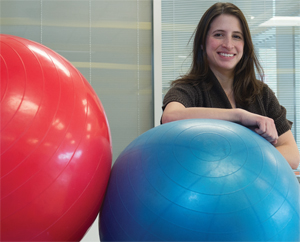October 28, 2014
From the Israeli Army to the O.T. Classroom
Liat Gafney-Lachter - Asst. Professor of Occupational Therapy
What do the Israeli Army, teaching occupational therapy and SVSU student mentoring have in common? Maybe the better question isn’t “what” they have in common, but “who.” The answer is Liat Gafni-Lachter, assistant professor of occupational therapy.
Prior to moving to the U.S. in 2008 and joining SVSU in 2011, Gafni-Lachter completed her compulsory service as a medic in the Israeli Army. After a short time, she began training medics (and then ultimately, trained the trainers), and discovered her love of teaching.
Something she learned as a 19-year-old working with all sorts of people—from combat soldiers to MD.s—was the value of a respectful, relationship-based approach to the job.
Upon completion of her military duty, Gafni-Lachter discovered something else: that she was passionate about her choice of occupational therapy as a career. “It is the perfect combination of all that interests me—scientific, medical, psychological, developmental, in-depth critical thinking and art helping a client find a path back to health.”
 Gafni-Lachter said what she enjoys most about teaching at SVSU is how relationships with students are valued at an institutional level. “At a lot of larger universities, it’s hard to find professors who are available to talk to students, let alone relate to them. I find my students the most rewarding part of the job. I enjoy engaging them in meaningful conversations, asking them, ‘Who do you want to be? Do you want to make a difference?’”
Gafni-Lachter said what she enjoys most about teaching at SVSU is how relationships with students are valued at an institutional level. “At a lot of larger universities, it’s hard to find professors who are available to talk to students, let alone relate to them. I find my students the most rewarding part of the job. I enjoy engaging them in meaningful conversations, asking them, ‘Who do you want to be? Do you want to make a difference?’”
Much of what Gafni-Lachter learned in the army has been translated into her teaching philosophy and learning expectations of herself as well as of her students. “I expect myself to be knowledgeable, and I expect the same of my students. I think my students would say I am tough in terms of my professional expectations. I want them to work hard, and in the end, have a sense of pride and a feeling that they have gained something from the class.”
The importance of great mentors is another take-away from her army experience that Gafni-Lachter has brought to the O.T. program. “In O.T., much of the learning is a reflective practice, and that comes from interacting with someone who is asking tough questions.” Seeing an opportunity in O.T. to enhance the classroom and fieldwork education, Gafni-Lachter revised the second-year leadership course she teaches and created a mentoring program. Early indications from second-year mentors and first-year mentees suggest success.
From the Israeli Army to University Center—it makes perfectly good sense to Liat Gafni-Lachter.
